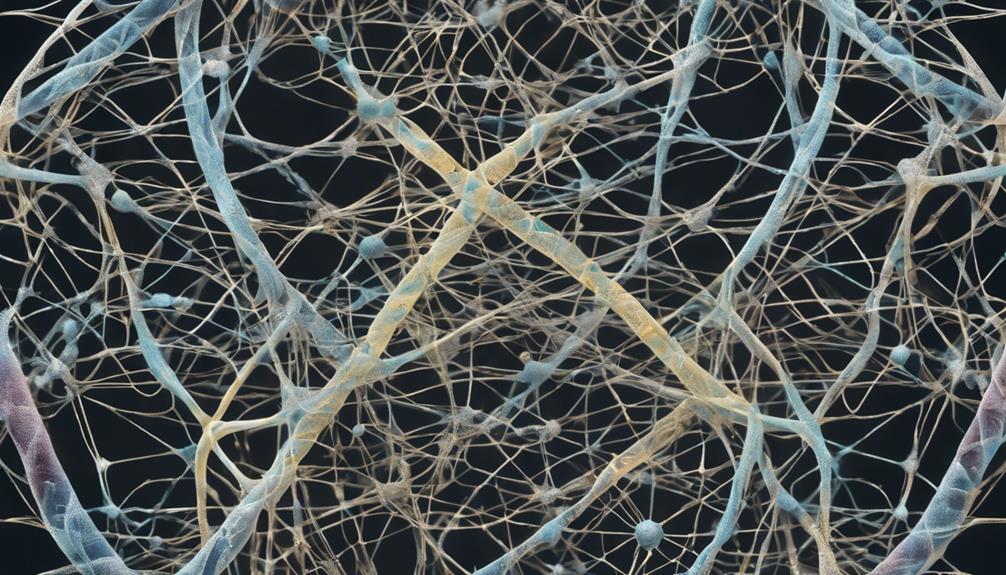In the intricate landscape of mental health, schizophrenia and dementia frequently overlap, with their symptoms and vulnerabilities closely intertwined.
Exploring the intricate relationship between these two conditions can shed light on the overlapping pathways that shape their progression and impact on individuals.
Understanding how these conditions interact could offer insights into potential avenues for early intervention and tailored treatment approaches that address the unique needs of those navigating both schizophrenia and dementia.
Key Takeaways
- Genetic link between schizophrenia and dementia suggests shared risk factors.
- Late-onset schizophrenia after 60 increases dementia risk significantly.
- Identifying dementia in schizophrenia patients requires careful cognitive and brain assessments.
- Tailored multidisciplinary treatment plans and lifestyle interventions aid cognitive management.
Prevalence of Schizophrenia and Dementia
When considering the prevalence of schizophrenia and dementia, it becomes evident that these mental health conditions impact a significant portion of the global population, with distinct patterns emerging in terms of age and gender.
Schizophrenia, affecting approximately 1% of individuals worldwide, presents a complex relationship with dementia. Those with schizophrenia face a nearly twofold increased risk of developing dementia compared to the general population. This risk escalates in individuals with late-onset schizophrenia, particularly after the age of 60.
Moreover, men diagnosed with psychotic disorders are three times more likely to experience dementia compared to women with similar conditions. The overlap in cognitive and behavioral symptoms between schizophrenia and dementia further complicates diagnosis and management strategies.
Understanding these prevalence rates and associated risks is crucial for healthcare providers to deliver targeted care and support to individuals grappling with the challenges posed by these intricate mental health conditions.
Shared Risk Factors and Genetic Links

Considering the shared risk factors and genetic links between schizophrenia and dementia sheds light on the complex interplay of genetic predispositions and environmental influences in the development of these mental health conditions. Both disorders exhibit symptoms of cognitive impairment, further highlighting their interconnected nature.
Here are key points to understand this relationship:
- Genetic Link: Studies suggest a genetic link between schizophrenia and dementia, potentially contributing to their co-occurrence.
- Environmental Factors: Stress and substance abuse are environmental factors that can increase the risk of both schizophrenia and dementia.
- Shared Risk Factors: Individuals with schizophrenia may have a higher likelihood of developing dementia due to overlapping genetic vulnerabilities.
- Preventive Strategies: Understanding the shared genetic and environmental factors can aid in identifying potential preventive strategies for managing both conditions.
Impact on Cognitive Functioning
Understanding the impact of cognitive functioning in individuals with schizophrenia and dementia reveals the intricate challenges they face in daily life. Cognitive impairments associated with these conditions encompass a range of deficits, including attention deficits, executive functioning challenges, and learning and memory deficits. Moreover, affected individuals may exhibit abnormal movements, loss of initiative, and underestimation of their ages, all of which can significantly impede their daily functioning. Structural brain changes, such as ventricular enlargement and cortical atrophy, play a crucial role in the cognitive decline observed in schizophrenia and dementia. These changes are often reflective of the neuropathological alterations seen in demented schizophrenic individuals. Diagnosis of dementia in the presence of schizophrenia can be particularly challenging due to the overlapping symptoms and cognitive impairments. Clinicians must carefully assess cognitive functioning and consider the underlying structural brain changes to provide appropriate care and support for individuals facing these complex comorbidities.
| Cognitive Impairments | Structural Brain Changes | Dementia Diagnosis |
|---|---|---|
| Attention deficits | Ventricular enlargement | Challenging |
| Executive functioning challenges | Cortical atrophy | Complex |
| Learning and memory deficits | Structural changes | Overlapping symptoms |
Challenges in Diagnosis and Treatment

Navigating the complexities of diagnosing and treating schizophrenia and dementia poses significant challenges for healthcare professionals and individuals alike. When addressing these conditions, we encounter obstacles that require careful consideration and tailored approaches.
- Challenges in Diagnosis: Distinguishing between schizophrenia and dementia can be intricate, with dementia assessments focusing on cognitive decline rather than definitive tests. Brain scans and bloodwork play a crucial role in identifying dementia markers, whereas schizophrenia diagnosis relies on symptom manifestations like delusions and hallucinations. The overlap in symptoms, particularly with frontotemporal dementia, can lead to misdiagnosis, emphasizing the challenges in accurate differentiation.
- Memory Difficulties and Executive Function: Both conditions often present with memory difficulties and executive function challenges. While dementia typically commences with memory issues and progresses terminally, schizophrenia exhibits unique early symptoms. Managing these cognitive and behavioral impacts requires targeted treatment strategies tailored to each individual's needs.
In addressing these challenges, a comprehensive and individualized approach is essential to provide effective care and support for individuals facing schizophrenia and dementia.
Strategies for Managing Dual Conditions
To effectively manage dual conditions of schizophrenia and dementia, a multidisciplinary approach with personalized treatment plans is crucial. Individuals with both schizophrenia and dementia require regular monitoring of cognitive function and symptom management to address their unique needs. Incorporating lifestyle interventions such as maintaining a healthy diet, engaging in physical exercise, and participating in cognitive training can be beneficial in managing the cognitive and mental health aspects of these conditions.
Moreover, establishing strong social support networks, providing caregiver education, and facilitating support groups are essential components of care for individuals with dual conditions. These resources not only offer emotional support but also provide valuable resources for both patients and caregivers. Close collaboration between healthcare providers, caregivers, and patients is vital to ensure the effective management of schizophrenia and dementia. By implementing these strategies and adopting a holistic approach, individuals with dual conditions can receive the comprehensive care they need to enhance their quality of life.
Frequently Asked Questions
Is Schizophrenia Linked With Dementia?
Yes, schizophrenia is linked with dementia. Research indicates that individuals with schizophrenia face an increased risk of developing dementia compared to the general population.
This risk is even higher for men and those who develop schizophrenia later in life. Long-term use of antipsychotic medications may further elevate this risk.
Understanding this connection is crucial for providing appropriate care and support to individuals affected by these conditions.
What Type of Dementia Mimics Schizophrenia?
When considering conditions that can resemble schizophrenia, frontotemporal dementia stands out. This type of dementia shares symptoms like behavioral changes, language difficulties, and executive function impairments with schizophrenia.
It can lead to social withdrawal, apathy, and disinhibition, creating diagnostic challenges. Despite these similarities, factors like age of onset and specific cognitive deficits can aid in distinguishing between frontotemporal dementia and schizophrenia.
Thorough evaluations are essential for accurate differentiation.
What Is the Life Expectancy of a Schizophrenic Person?
We understand the concern surrounding the life expectancy of individuals with schizophrenia. It's important to note that factors like higher rates of suicide, cardiovascular disease, and respiratory illnesses contribute to a reduced lifespan.
Lack of access to healthcare services and unhealthy lifestyle choices also play a role. Early detection and comprehensive healthcare management are vital in improving the overall well-being and life expectancy of those with schizophrenia.
What Happens if Schizophrenia Is Left Untreated?
If schizophrenia is left untreated, symptoms may worsen, leading to delusions, hallucinations, and impaired thinking.
Social isolation, decreased functioning, and lower quality of life can result without intervention. The risk of self-harm, substance abuse, and suicidal behavior may increase.
Additionally, cognitive decline, memory problems, and challenges in daily activities could develop over time. Early diagnosis and appropriate treatment are crucial to prevent symptom progression and improve outcomes.
Conclusion
In conclusion, the intertwining complexities of schizophrenia and dementia highlight the urgent need for comprehensive care and support for individuals facing these dual conditions.
By recognizing shared risk factors and genetic links, addressing cognitive decline, and implementing strategies to enhance cognitive reserve, we can strive towards improving outcomes and quality of life for those navigating the challenges of both disorders.
It's through this holistic approach that we can truly make a difference in the lives of those affected.









